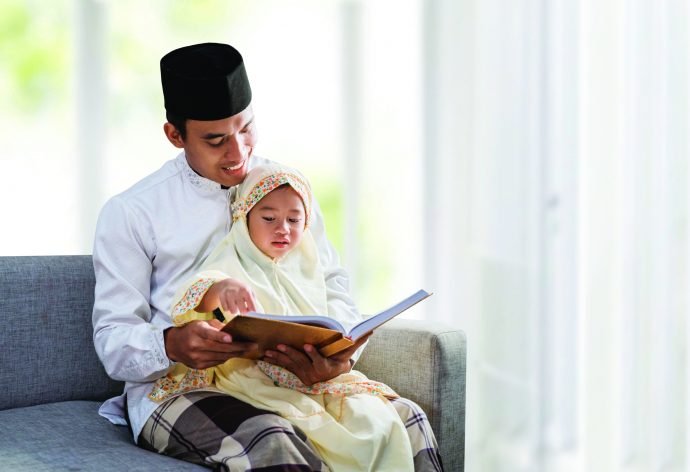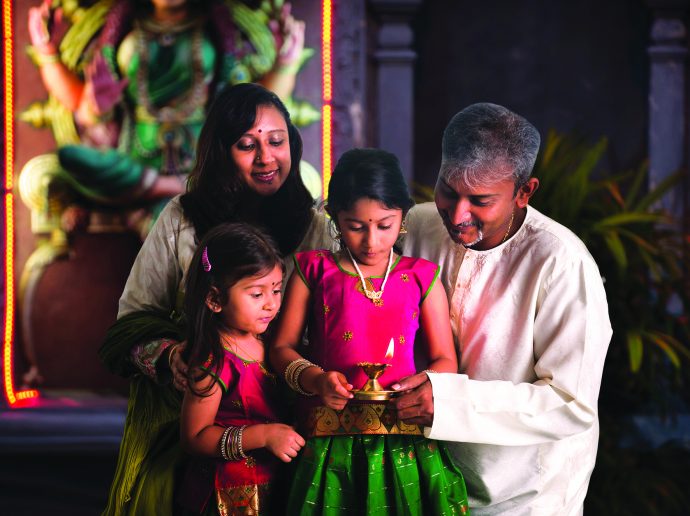In light of the COVID-19 pandemic, “spirituality” has played a crucial role as a coping mechanism for some families and individuals. While it is less often explored in relation to parenting, many studies have shown that spirituality is, in fact, an effective approach in managing family and raising children.
The emergence of COVID-19 since last year has caused an unprecedented health crisis across the globe, affecting people physically, mentally, financially and socially. To alleviate the difficulties and stresses in dealing with the pandemic and ensuing lockdowns, multiple approaches have been taken by the governments, institutions and individuals.
Spirituality plays a major role in helping some families cope during this extraordinary period. It can serve as an empowering foundation to any collective, the family unit being the most basic example. Indeed, spirituality is an integral component in parenting that should not be overlooked even during normal times.
Understanding spirituality
Firstly, what do we understand about spirituality? Many people relate spirituality to religious traditions and the belief in a divine power, but it can also mean a general belief of the universal connection between oneself with other living beings and the Earth as a whole.
Spirituality suggests that life is much more than our sensorial, physical experience. Spiritual experience is subjective and may differ between individuals. Some experience it within a community, and some may obtain it in nature, while for others, spirituality is a solitary journey.
According to Prof Dr Alvin Ng Lai Oon, “Spirituality comes from the word ‘spirit’, a concept of the inner consciousness that the self identifies with. It involves the journey to understand the self in relation to life, namely to other people, the environment, and in many cases, in relation to a divine or higher power, while making sense of how to live a meaningful life.”
The clinical psychologist elaborates, “Spirituality includes introspection and reflection of feelings, thoughts, beliefs and behaviours with regard to personal meanings that are identified with the existence of the self. Insights from these introspections and reflections typically lead to better self-awareness and personal interpretations that foster improvements in attitudes and behaviours for a better life.”
As a Muslim, En Hairil Fadzly Md Akir believes that “Spirituality is a fundamental aspect of human life that needs to be inculcated from a young age. It is a way to understand the purpose and meaning of all creation and to bring ourselves closer to the Creator. Religion teaches us how to do that. It also provides guidance on what is good and bad in our life and develops our behaviour and inner strength.”
The use of spirituality
Spirituality in its most general sense is practised for a range of purposes and benefits. For many people, spirituality helps them to contemplate philosophical questions (e.g. “What is the meaning of life?”, “What is the best way of living?”), find a sense of community and support, and develop a more optimistic outlook on life.
Prof Ng, who is also the founding president of Malaysian Society of Clinical Psychology, states “Spirituality functions as the bridge towards a ‘good life’. We benefit from spirituality by developing knowledge, values, behaviours and skills that promote general well-being, which is to be healthy, functional and adaptive. Cultivating spirituality also develops social harmony through adaptive behaviours that come from a collective understanding of personal responsibilities towards each other.”
“A highly spiritual person would be aware of his or her role within the community, and would behave responsibly as part of the social system, towards a common goal of wellness. Consequently, this promotes positive values such as kindness, compassion, generosity, gratitude, friendliness, self-acceptance and mindfulness, all which lead to personal and social health,” he adds.
“Simply speaking, spirituality is a path to empower ourselves and be a better person,” says En Hairil, the Deputy Director-General of National Population and Family Development Board (LPPKN). “It cultivates self-control, self-development and self-actualisation. It forms a part of holistic personal development that consists of intelligence (IQ), emotional intelligence (EQ) and spiritual intelligence (SQ).”
Datuk Dr Zulkifli Ismail, the chairman of Positive Parenting Programme, states “Spirituality also serves as a coping mechanism against adversities in life, such as financial problems, physical illnesses, as well as mental issues, like depression and anxiety. Research has shown that individuals who apply spirituality in dealing with these life challenges experience many benefits to their health and well-being. They tend to have better mental health and adjust more quickly to health problems.”
Spirituality and family
“Malaysian Family Well-Being Index, a time series study by LPPKN,” says En Hairil “identifies religion/spirituality as one of the contributing factors to family well-being, apart from other factors like family relationship, health and economy.”
The father of five explains “The domain of Family and Religion/Spirituality resulted in the highest score in the Family Well-Being Index in 2011, 2016 and 2019 compared to other domains surveyed. The result for the domain was based on two indicators: 1) the role of religion and 2) the impact of spiritual practice. This demonstrates that religion/spirituality is one of the main protective factors for the well-being of Malaysian families.”
“The practise of religion/spirituality in family contributes to family stability. A spiritual family prioritises family relationships and this increases the participation of each member in family life. Family bonds are maintained through efforts to increase kindness, patience, communication, stress management, as well as with prayers and rituals,” says Datuk Dr Zulkifli.
The consultant paediatrician and paediatric cardiologist adds, “Research has also found that children and teens raised with religious or spiritual practises are more likely to have better mental health and a healthier lifestyle. They have greater life satisfaction, are able to process emotions better and more forgiving than those who have never prayed or meditated. They are also more likely to participate in volunteer works and less likely to be involved in negative activities.”
Thus, how can parents incorporate spirituality in their parenting? Prof Ng suggests that parents should note how spiritual practises affect their children emotionally, behaviourally and cognitively, and to adapt these practises in situations involving their children.
He explains, “One common approach is to use examples from religiously-inspired stories or teachings. Tell your kids the story of how a religious figure coped with adversities and what they can learn from the story. You should also model spirituality practises and teachings to your kids. When you say, “Love thy neighbour” or “Do unto others as you would have them do unto you”, be an example to your kids and show kindness to people around you and your family.”
Raising spiritual children
“Spirituality is an aspect of human development, but the topic tends to be ignored in the larger circle of science. Regardless, studies are showing that children do have an innate spiritual capacity and are capable of spiritual experiences. Even children not raised in a religious family are likely to ask spiritual and existential questions,” Datuk Dr Zulkifli comments.
Spiritual development can be defined as “the process of growing the intrinsic human capacity for self-transcendence in which the self is embedded in something greater than the self.” To achieve holistic development in children, it is important to also nurture their spirituality from young.
Prof Ng offers some actionable advice to instil spirituality in children:
- Communicate the practicality of spiritual virtues. Teach children to understand the practical nature of spiritual virtues such as kindness, compassion, generosity, patience, honesty, etc., which are all protective factors in life. Explain how these virtues keep them out of external (e.g. harm, rejection, disrespect) and internal troubles (e.g. guilt, shame, frustrations), and also helps them develop personal strengths (e.g. self-esteem, integrity, discipline, positive coping mechanisms, etc).
- Explain abstract concepts with examples. Too often children are taught spiritual values with abstract concepts such as the promise of a better life after death or that God loves them. We need to understand that children (and even adults) have difficulty understanding abstract concepts. So, it is more helpful to link spiritual values with actual pragmatic outcomes. These are often demonstrated through religious stories that inspire and encourage appropriate behaviours and methods for dealing with daily challenges.
- Incorporate in daily life. Parents can use spirituality as a problem-solving approach or as a daily practice for overall wellness. For example, when your child is feeling down, tired, uninspired or frustrated, you can bring up memories of gratitude and try to find things to be grateful for or to be inspired by (e.g. religious stories). Engage in religious or spiritual practises and see how doing these can improve his or her emotion or inspire healthy coping.
Meanwhile, En Hairil suggests that parents should:
- Acknowledge your child’s spiritual questions. Examples of spiritual questions are: “What happens after we die?”, “Why do bad things happen to good people?”, “Do animals have a soul?”, etc. These questions may be tough, but if you ignore them, children may think that it is off limits or not important. Try to answer as honestly as possible. Even if you do not have all the answers at the time, engage with them and explore possible explanations.
- Avoid overindulging your child. Do not pamper them by providing unnecessary material excesses or doing things that they should be doing themselves. Set reasonable rules and assign responsibilities to them. Overindulgence and excessive materialism hinder your child’s spiritual development. They may grow up into adults who feel entitled to more than what they deserve, are ungrateful and materialistic, and unable to find a bigger meaning in life.
- Lead by example. Align your parenting with spiritual values and demonstrate these values in your actions. For example, if you want to teach generosity to your child, be generous to those who seek help from you. If you want to encourage them to practise religious obligations, lead the way and include all family members.
Parents need to understand their role as the first teacher to their children. When it comes to life principles and moral guidance, parents are the one responsible to impart these to their children. But it is also important for parents to seek proper guidance from religious experts in matters of faith and religion, as you would seek a doctor’s advice in matters involving your child’s health.
A spiritual child tends to be more at peace, curious, resilient and optimistic, and has a deeper sense of empathy and connectedness with those around him. Apart from children’s physical, emotional, intellectual and social development, their spiritual growth is an important aspect that needs to be considered in our parenting strategy. Spirituality is one way for us to cope with challenges and difficulty in day-to-day life and also to help us raise our kids to be better individuals.
“Let parents bequeath to their children not riches, but the spirit of reverence.” – Plato










Comments